

Coordinate Plotter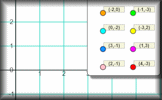
Drag the given points so that they are in the correct positions according to their coordinates.
Coordinates Picture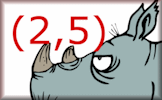
Plot the coordinates and join them with straight lines to produce a picture.
Coordinates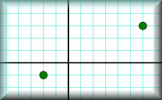
A self marking exercise on identifying coordinates culminating in finding the mid point of two given points.
Plotting Graphs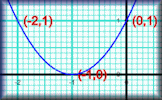
Complete a table of values then plot the corresponding points to create a graph.
Deconstructing Graphs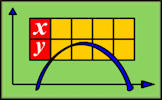
Fill in the tables of values from the information that can be read from the given graphs.
Transformations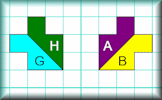
Draw transformations online and have them instantly checked. Includes reflections, translations, rotations and enlargements.
Where's Wallaby?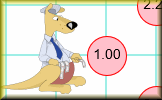
Find the hidden wallaby using the clues revealed at the chosen coordinates.
Coordinate Geometry Table
Fill in the empty cells of this table with information about lines, gradients and coordinates.
This is the main Transum help video on Coordinates.
Coordinates Video
For those who would like a reminder about coordinates here it is. This video is to help you do the online, self-marking exercises
Opposites
About the Japanese street grid system and other opposites.
Graph Paper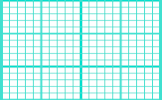
Flexible graph paper which can be printed or projected onto a white board as an effective visual aid.
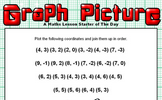
Graph Picture
Plot the given coordinates then join them up to form a picture.
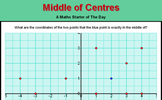
Middle of Centres
The blue point is exactly in the middle of two red points. What are their coordinates?
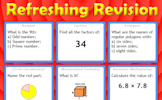
Refreshing Revision
It is called Refreshing Revision because every time you refresh the page you get different revision questions.
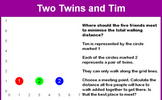
Two Twins and Tim
A tricky problem set on a coordinate grid.
14 items are currently in this category.
Teachers might find the complete Coordinates Topic List useful.
It is important that pupils become proficient at understanding coordinates at a basic level before using them in their study of graphs. Plotting points and finding the coordinates of points are the pre-requisite skills for studying a number of branches of mathematics.
The Cartesian plane consists of a horizontal x-axis and a vertical y-axis that intersect at the origin (0, 0). The mathematician René Descartes developed the concept of the Cartesian plane while lying in bed one morning and observing a fly on the ceiling!
Pupils should learn the conventions starting with knowing that the horizontal axis is the x-axis and the vertical axis is the y-axis (remember x is a cross so the x axis is across!). The axes meet at the origin which has coordinates (0,0).
Coordinates are written as two numbers separated by a comma and contained inside brackets. For example (3,9) means the point is above 3 on the x-axis and level with 9 on the y-axis. To get to this point from origin you go along 3 and up 9 (remember to go along the hall before going up the stairs or that pole vaulter has to run along before leaping up into the air!).
Coordinates can be positive or negative (remember points to the right of the origin have a positive x-coordinate – being positive is right!).
The abscissa often refers to the horizontal coordinate of a point and the ordinate refers to the vertical coordinate.
In three dimensions, three perpendicular lines are defined as the axes and the coordinates of each point is defined with three numbers.